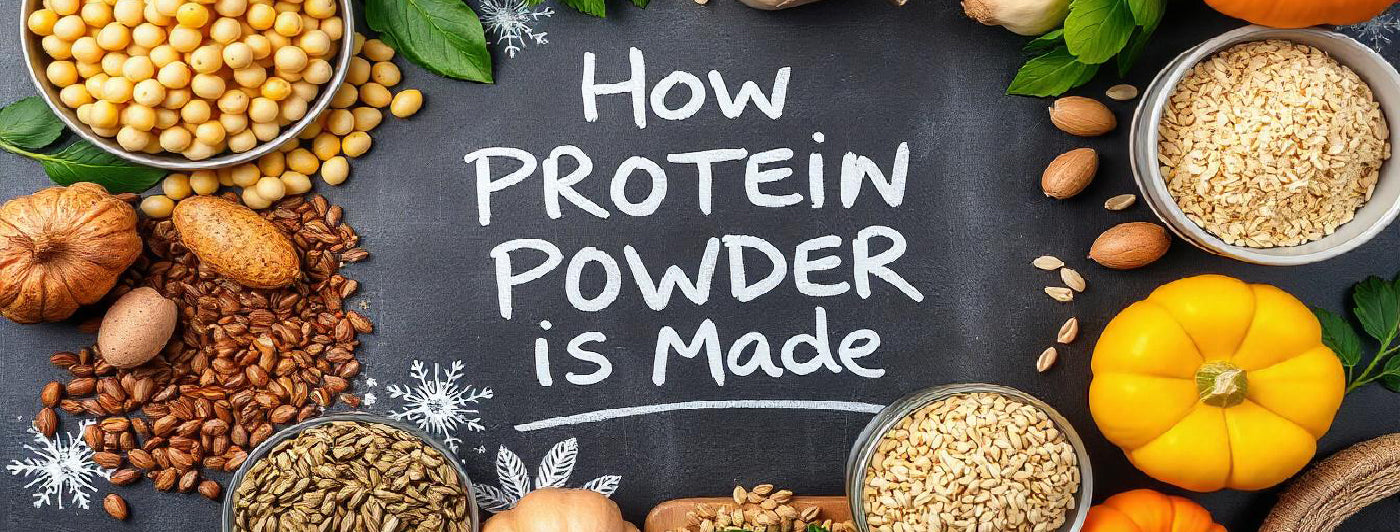Protein powder is a critical supplement for supporting various physiological functions, particularly muscle growth and repair. The method used to create protein powder is a precise, multi-step process that ensures bioavailability, nutrient density, and safety for human consumption. This article will explore how protein powder is made from a scientific perspective, highlighting the importance of its manufacturing methods and the impact on health and performance.
The Protein Powder Manufacturing Process

The Raw Materials
The starting point in the production of protein powder is the selection of high-quality raw materials, which can either be derived from animal sources (such as whey and casein) or plant-based alternatives like soy and pea protein powder. As the demand for sustainable and allergen-friendly options grows, plant-based vegan protein powders for muscle gain are gaining prominence due to their environmental benefits and suitability for individuals with specific dietary needs.
Step 1: Protein Extraction and Isolation
A fundamental aspect of how protein powder is made lies in the extraction of protein from its raw source. For whey protein, the process begins with the liquid byproduct from cheese production, which contains a mixture of water, lactose, and protein. This liquid undergoes filtration processes—typically microfiltration or ultrafiltration—to concentrate the protein. During this step, smaller molecules like water and lactose are separated from the protein molecules.
For plant-based proteins, like pea protein powder, a different isolation process is used. The raw peas are first ground into a flour, after which mechanical separation or aqueous extraction methods are applied to isolate the protein from carbohydrates and fiber. This produces a high-protein concentrate, often containing minimal allergens, ideal for individuals who are protein deficient or avoiding dairy and soy.
Step 2: Protein Concentration
Once isolated, the protein must be further concentrated to achieve the desired purity level. Two common categories exist: protein concentrates and protein isolates. Protein concentrates contain around 70-80% protein by weight, with the remainder being carbohydrates and fats. Protein isolates, in contrast, are more purified, containing up to 90% protein. The choice of concentration depends on the end use and desired nutritional profile of the product.
This process ensures that protein powders, especially plant-based vegan protein powders for muscle gain, retain a high concentration of essential amino acids necessary for muscle repair. Concentrates are typically preferred for everyday use, while isolates may be used by athletes and bodybuilders aiming for maximal muscle gains.
Step 3: Drying and Powderization
The next critical phase in how protein powder is made is transforming the extracted protein into a stable powder form.This is typically achieved through spray drying, a method that involves atomizing the liquid protein concentrate into a fine mist, which is then exposed to hot air. The rapid evaporation of water leaves behind a fine powder rich in protein. This method helps preserve the nutritional integrity of the protein, ensuring minimal denaturation during processing.
Step 4: Flavoring and Fortification
Once the powder is formed, additional steps are taken to improve its flavor, texture, and nutritional profile. Sweeteners, flavors (such as vanilla or chocolate), and other additives are blended into the protein to enhance palatability. In some cases, manufacturers add vitamins, minerals, and bioactive compounds, making the product a more comprehensive supplement for athletes and individuals looking to prevent protein deficiency.
Why the Protein Manufacturing Process Matters
Protein Quality and Bioavailability
The method of processing directly affects the final quality of the protein powder. Poor extraction techniques or excessive heat during drying can cause protein denaturation, which reduces the bioavailability and effectiveness of the supplement. For instance, cold-processed whey proteins are considered superior because they preserve essential amino acids and minimize protein degradation. Similarly, pea protein powder, known for its rich amino acid profile, offers a highly bioavailable option for individuals seeking plant-based vegan protein powders for muscle gain.
Nutrient Preservation
In addition to maintaining protein integrity, the manufacturing process also affects the retention of other nutrients such as vitamins, minerals, and antioxidants. For example, heat-sensitive compounds, including certain vitamins, can be lost during high-temperature processing. Understanding the specifics of how protein powder is made can guide consumers to choose products that maintain the highest possible nutrient content.
The Role of Plant-Based Protein in Muscle Gain
Advantages of Plant-Based Proteins
Plant-based vegan protein powders for muscle gain, such as those derived from pea protein powder, have been shown to be equally effective as their animal-based counterparts. These powders contain essential amino acids like leucine, which play a key role in muscle protein synthesis, helping prevent muscle wasting and supporting recovery post-exercise. Additionally, they are rich in fiber and free from common allergens like lactose, making them ideal for individuals who are protein deficient or sensitive to dairy.
Environmental and Ethical Considerations
The environmental footprint of plant-based vegan protein powders is significantly lower than that of animal-based proteins, due to the reduced land and water use in cultivating plants like peas. This makes them a more sustainable option for eco-conscious consumers without compromising on quality or effectiveness.
Choosing the Right Protein Powder
Assessing Dietary Needs and Preferences
When selecting a protein powder, it’s essential to consider your unique dietary needs and preferences. Individuals with dairy or soy allergies may opt for pea protein powder, while those aiming to support muscle gain with minimal additives might prefer cold-processed whey isolates. Ensuring that the protein powder contains a complete amino acid profile is crucial for preventing protein deficiency, especially in those who may struggle to meet their protein requirements through diet alone.
Evaluating Additives and Purity
In addition to protein content, evaluating the purity of the powder and the types of additives used is critical. Products with minimal artificial sweeteners, preservatives, or unnecessary fillers are generally more favorable. Organic or non-GMO certifications are also key indicators of quality.
Conclusion
Understanding the science of how protein powder is made offers critical insights into the quality and effectiveness of these supplements. Whether you are focusing on plant-based vegan protein powder for muscle gain, preventing protein deficiency, or improving post-exercise recovery, the production process is fundamental to choosing a protein powder that meets your needs. As plant-based proteins like pea protein powder become more prominent, it is essential to be informed about the science behind their production and the benefits they offer.
By selecting a high-quality, scientifically produced protein powder, you can enhance muscle growth, support overall health, and make a more sustainable choice for the environment.











